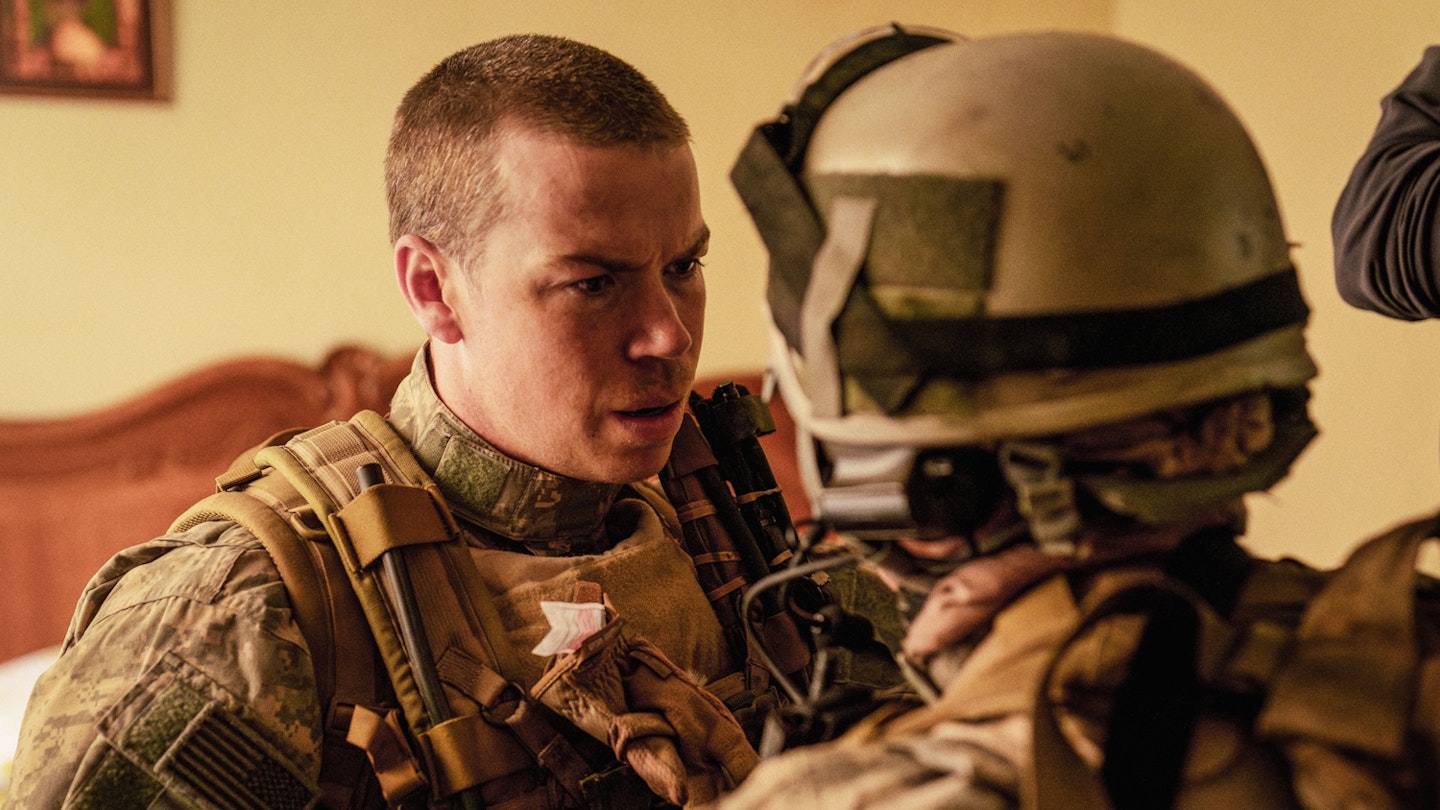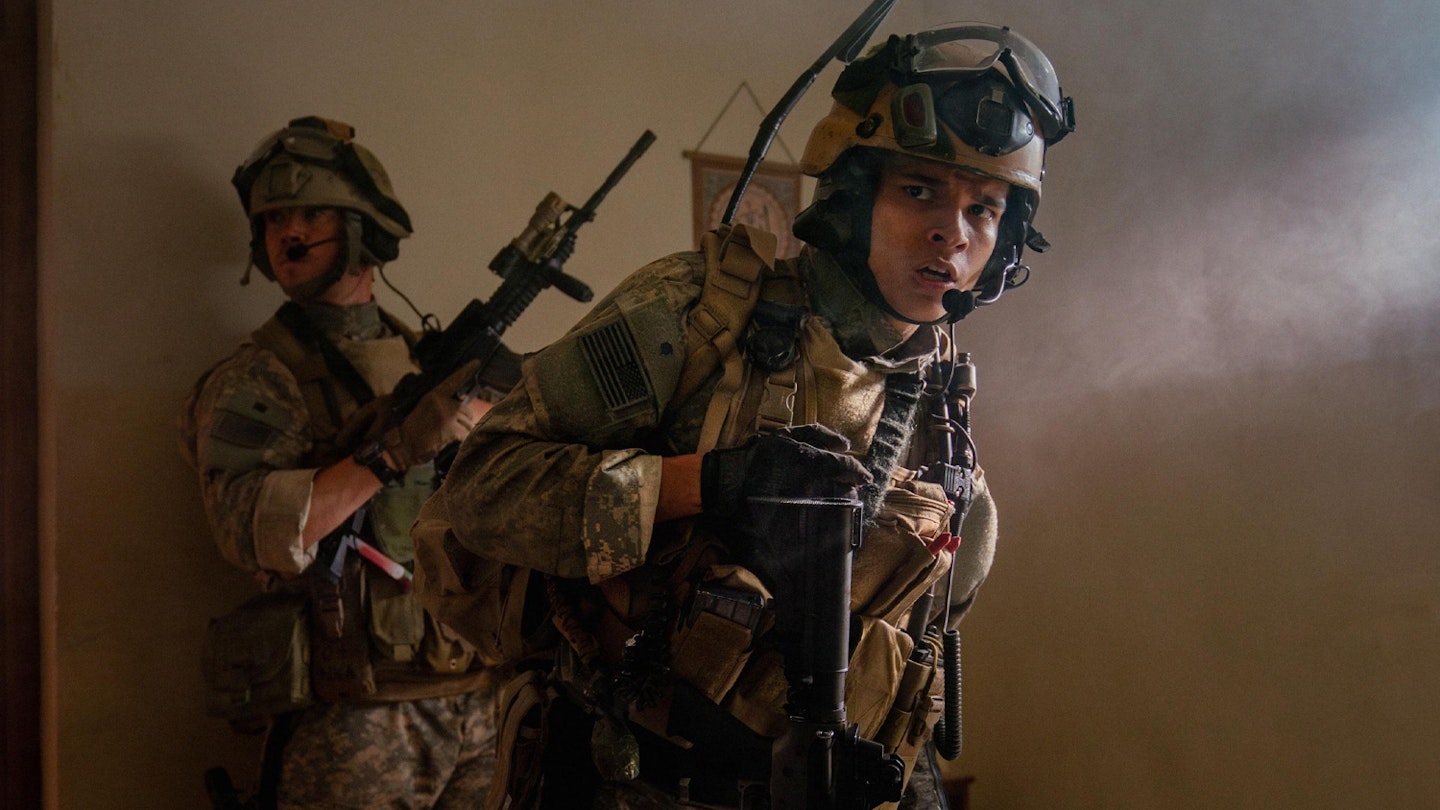Appropriately, Warfare begins with a deafening assault, as Eric Prydz’s horny 2004 aerobics video for ‘Call On Me’ fills the screen, its sweaty, hormonal hardbodies lunging and lurching. We wonder what, in 2025, we’ve done to deserve this, before the film cuts to a group of grinning, hollering young soldiers watching the video — a tight-knit unit getting their rocks off. These are the young men we’re going to be spending the next hour-and-a-half with; this, of all things, is the calm before the storm.

For a film that, in time, consistently attacks the senses, this opening is fittingly jarring, but it also speaks to the economy of it all. There is no dialogue in the scene: swiftly and wordlessly (other than Steve Winwood’s relentless vocals), it shows us how ingrained this group are with one another, how comfortable, how close. And for its entirety, Warfare is as compact as it gets. There’s not an ounce of fat on it.
For the first 30 minutes, there is little action. It’s 2006, and this is a Navy SEAL unit staking out a residential area, seizing an apartment from a terrified Iraqi family in the dead of night, setting up shop with their sniper rifles as they observe persons of interest across the street. “The film uses only their memories,” we read of the team at the start: it is a true story, and everything we see is constructed entirely from the reminiscences of Ray Mendoza (played here by D’Pharaoh Woon-A-Tai) and his comrades. Mendoza, who became a military advisor in the film industry (including on Garland’s Civil War) after leaving the forces, co-directs with Garland: broadly, Mendoza worked with the actors while Garland took care of the camerawork, and they wrote the film together. As they have explained, there is no dramatic invention whatsoever. And the script is spare. The film never smells of screenwriting. As the group sit around the apartment preparing to strike, there is a lot of chemistry but no banter. No bullshit. No backstories. No monologues. Just the work. As a result, we feel embedded too.
There are no showy visual flourishes – just lean, mean storytelling.
Soon, and suddenly, they are bombarded by Al-Qaeda insurgents, and once the battle begins, it doesn’t stop, until the credits roll. Your heart-rate gets a workout. Shot in, more or less, real time, the film is on a simple mission: to get us as close as possible, from the safety of our cinema seats, to what war is actually like. As such, once it kicks in, there is no respite. They were not afforded any, so neither are we. “Dude,” says one of them at one point, “I’m fucked up.”
For the initial stretch, the camera is calm and studied, but as the team’s fortunes spiral it gets much closer, looser, to vivid effect: one sequence on the street is so immersive you find yourself ducking to avoid the bullet-spray. The camera surveys the damage, an unblinking witness to trauma: the second half of the film is a portrait of pain, and the horror is in the detail. The dry, cracked lips. Faces caked in dust and debris. The sheer terror in the eyes, the helpless shock and panic. It is loud and upsetting. Sound is key: in the pounding gunshots, in the ground-shaking explosions, in the ear-splitting roar of fighter jets, and in the agonising screams of the soldiers. RIP your local-cinema speakers. Yet for all it milks everything the medium offers, the filmmakers never get in the way. There are no showy visual flourishes, in their place just lean, mean storytelling.
Due to its source material, Warfare focuses on the Americans, but presents the situation from their perspective without the directors politicising. Everybody here is screwed. It may well be cinema’s most effective, purest anti-war film: there is no sentimentality, no hand-wringing, but most significantly not a second of it makes war look cool, or attractive. There is no score, Garland and Mendoza trusting the cast and the action to do the emotional heavy-lifting; no orchestral propping-up is necessary. Such simplicity makes it even more heartbreaking. It is deeply compassionate. So no, it’s not going to encourage anyone to sign up to the military in a hurry, but it is absolutely a tribute to those who do.
At the end, what’s left is rubble, physically and spiritually. And yet cinematically, Warfare is an exhilarating piece of work, because we have the luxury of experiencing it all, in all its power, at very close quarters, without getting hurt. Physically, in any case.

